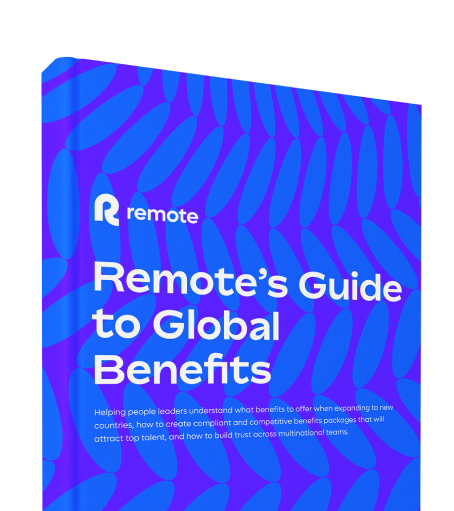
Product Updates — 7 min

Benefits & Leave — 15 min
Equity incentives, such as ESOPs and stock options, are a powerful tool to attract and retain great workers for your business. But offering stock options to employees in other countries can be a complex process.
To realize the advantages of providing stock options to your international team, you have to plan and execute your strategy effectively. This means taking into account where your employees live, how you handle their taxes, and what your wider global benefits stack should look like.
In this article, we’ll explain how to grant stock options to your foreign employees. We’ll cover important definitions and practical steps, and answer the most common questions around sharing equity in your business with your team.
Before we dive in, it's important to understand the difference between employee stock ownership plans (ESOPs) and offering stock options.
In an ESOP, employees do not generally pay anything for the shares they receive, and they are often designed to be used as a retirement fund.
However, with stock options, recipients are typically given the option to purchase the shares at a fixed price (known as the exercise price). If the market value of the shares is higher than the exercise price, your employees can then sell their shares and pocket the profit. As a result, it's more of a short-term incentive.
In the US, there is some confusion around these terms, with many people referring to ESOPs when they actually mean an equity incentives plan (and vice versa).
Therefore, in this article, we will focus on stock options, as these are the most popular type of equity incentive in the US (especially for smaller businesses). You can learn more about ESOPs in our guide here.
In their simplest form, stock options are structured as follows:
You allocate a set number of shares to each employee, with an option to buy at a specific exercise price (note that, in an ESOP, employees do not generally need to purchase the shares).
Once the employee is eligible (i.e., they have reached a certain performance milestone, or come to the end of their vesting schedule), they can decide whether to exercise their options or not.
If the share price (i.e., the current market value of the shares) is higher than the exercise price, the employee can sell their shares and pocket the profit.
For example, you give a new employee 1,000 shares with an exercise price of $10 per share. Once their vesting schedule is complete (usually around four years), they decide to exercise the option and purchase their shares for $10,000 (1,000 shares x $10).
At that point, the market value of the stock is $20 per share. The employee sells all their shares at this price, earning $20,000 (1,000 shares x $20). As a result, they make a profit of $10,000.

As mentioned, providing stock options to foreign hires is a great way to attract and retain top talent. It also incentivizes good performance, because when the company does well financially, the stock options gain value and the employee benefits.
This is particularly true for foreign workers, as stock options help you stand out from other potential employers. Many organizations are not aware of how to offer stock to employees in other countries and, if this is something you can offer, it can tip the scales in your favor.
Remote's global HR experts share practical advice for building a locally relevant and globally compliant benefits program to help you attract and keep the world's best talent.

Before you start offering stock options to your overseas team members, you need to know which types are the best fit, and — most importantly — whether your team members will be eligible to receive them.
This is because not all equity incentives are the same. With most stock option plans, for example, employees must purchase their shares before they can own them. However, in an employee stock purchase plan (ESPP) employees can make regular investments in their company’s stock at a discounted price. Stock awards, meanwhile, are given to employees for free as an incentive.
Common types of stock options include:
ISOs are a type of tax-favored stock option in the US, and are issued directly from the employer. They can only be given to employees (not investors or other partners).
It’s important to note that the issuer of the ISO must be the recipient’s direct employer. As a result, it’s not possible to issue ISOs if you hire people through an employer of record (EOR).
NSOs have a different tax treatment than ISOs in the US. However, unlike ISOs, you can offer NSOs to workers in other countries using an EOR. This allows your foreign employees to receive equity in your business legally, the same as your domestic employees.
NSOs are the most common way of offering equity to international team members.
EMIs are type of stock option offered in the UK. They are government-backed and specifically designed for smaller businesses and growth startups.
For employers, EMIs are flexible and highly customizable. There is no income tax due on grant or exercise, although there are tight eligibility restrictions, especially for larger businesses.
Unpack the complexities and compliance challenges, and see how you can easily offer stock options to your team members - wherever they're based.

Unsurprisingly, there are multiple compliance concerns when offering stock options, such as taxation, withholding, reporting, social insurance, and several other factors.
Broadly speaking, there are three things to consider when putting together a scheme:
Employer taxes: It’s crucial to understand the tax withholding and reporting requirements for each country you have team members in. If you do not file correctly in those countries, it could lead to penalties and fines for your business.
Employee taxes: Some countries offer tax-advantaged schemes for employees, but others don’t. The UK, for example, has multiple tax-advantaged schemes, all of which have different requirements and taxation obligations.
Tax reporting obligations: Understanding your tax reporting obligations across multiple countries can be difficult. You need to be aware of each country’s specific requirements, and know how to meet them as foreign company.
It's also important to understand local labor laws and how they might impact your plan. For example, if your equity incentives are performance-related, you may encounter issues (some countries prohibit certain performance metrics from being considered as part of an equity grant, while others do not allow performance to be considered at all). In the same vein, some countries may allow you to substitute cash for stock, while others may demand that all employees receive the same types of assets.
Staying on top of all these tax and labor regulations can be hugely complex and time-consuming, especially for smaller businesses and startups. As a result, it's highly recommended to work with a global expert like Remote Equity, which handles all of this for you.
Learn more about how Remote Equity can help.
Tax requirements for stock options and other equity incentives depend on the country in question. In general, though, the laws of the country where the issuing company is incorporated govern how the stock options are handled.
As well as dictating your compliance requirements, this can also significantly affect your tax obligations.
Employees are generally subject to taxes on stock options. However, what those taxes look like — and to which assets they apply — can vary drastically.
Tax-favored stock options allow employees to pay less in taxes when receiving equity (or when selling their shares). Certain types of equity — like ISOs and EMIs — can be considered tax-favored stock options.
Conversely, NSOs are not considered to be tax-favored options although, again, tax advantages vary by country.
Most preferential tax treatments depend on the employment relationship. In some cases, offering employees equity while using an EOR may make them ineligible to receive certain preferential tax treatments.
Note, too, that employees who receive, exercise, and sell their stock options may be taxed on each event. Employees typically pay taxes the year they exercise their stock (usually as income tax) and the year they sell (usually as a capital gains tax). Paying taxes upon exercise can be difficult if the company is not yet public or if the shares are not being purchased privately after exercise, as employees are paying taxes based on the value of stock they haven’t yet sold.
For foreign employees, capital gains taxes are calculated based on where they live. They can also differ based on the level of earnings. In France, for example, high earners pay more, while employees with lower salaries may be able to opt in to a different tax plan that could alter the capital gains tax rate.
Depending on where they live, employees typically have:
Rights related to information. This usually means access to data about vesting periods and fair market value of the stock.
Freedom of exercise. Some countries may require you to allow employees to exercise their shares after a certain period of time. Alternatively, they may prohibit you from enforcing certain vesting schedules.
Certain levels of company ownership. Some countries — like Mexico — require companies to share profits with their employees.
Once you have the right tax, legal, and compliance support in place, you can start to offer stock options to your international employees. Here are the key steps in the process:
Decide how much stock to set aside for your employees.
Work with your legal team to ensure you have an ironclad plan.
Identify the countries in which you will need to offer options.
Consult with your EOR (if relevant) to understand your international equity opportunities.
Comply with the laws of the country where you are headquartered to establish the plan and the fair market value of the shares.
Determine what type of stock options you want to offer your international employees.
If you're ready to get started, Remote Equity can help you begin offering stock options to your international employees with ease.

Remote can help you whether you already have an equity incentive scheme in place, or you’re just getting started.
We take the guesswork out of global equity incentives in the following ways:
Equity plans. Our dedicated legal experts can review your legal documentation to help you determine whether your scheme is compliant. And if you don’t have any yet, we can share best practices for setting up schemes that are fair and inclusive.
Local tax laws. Our team of tax law experts can help you understand the tax consequences of offering equity incentives in every country where we operate.
Withholding and reporting. Let’s say one of your team members vests in Norway and another team member exercises in Canada. All you have to do is let us know, and we’ll take care of the tax withholding and reporting.
In some countries, such as Switzerland, you may still have withholding and reporting obligations on your side, but we’ll make sure you know exactly what to do. To help you plan ahead, we’ll also keep you apprised of any upcoming taxable events in your team members’ jurisdictions.
Yes! Our clients are able to offer stock options directly to any employee who is employed through Remote’s EOR service. Stock options simply need to be offered (or converted to offer) in a country-compliant form (such as NSOs instead of ISOs).
For example, if you’re based in the US, you can offer ISOs to your domestic employees. However, as you cannot use an EOR to offer ISOs to foreign employees, you would need to offer an alternative, such as NSOs.
Remote can support you in offering stock options to your employees. However, you must always give the stock options directly to the employee, as stock options are a financial instrument and only the issuing company (in this case, you, the customer) may legally offer and hold the financial instrument.
There are many different types of option contracts, but most of these financial instruments are highly restricted, and you need certain licenses to offer, manage, or hold them. You may offer certain financial instruments as a company (i.e. issue debt or option rights), but that doesn’t enable any third party to operate without a license.
Note, too, that stock options must be separate from the benefits packages of your foreign employees. If you do not own and operate your own local legal entity in the country in question, Remote can help you offer NSOs (and other equity incentives) as separate offerings from your benefits plan. With Remote's help, you can offer stock options directly from your company to your employees.
Remote Equity has partnered with Carta to make offering stock options easier than ever, especially for startups and small businesses.
Carta helps companies and investors manage valuations, investments, and equity plans. Through Remote Equity's partnership with Carta, you can maintain an accurate cap table, access fundraising tools and benchmarks, and generate and track your SAFEs, all in one place.
There are a collection of unique features available to Carta customers, but here are two of the most valuable:
Cap table management: With Carta, your cap table updates automatically when you issue electronic securities, raise a round, or get a 409A valuation.
Carta Total Compensation: Carta Total Compensation provides you with the world’s largest equity data set and powerful HR integrations to help you make better compensation decisions faster.
Note, too, that Remote customers get free access to Carta Launch plus 20% off their first year's subscription when upgrading to a paid plan.
Need help navigating stock options for your international employees? Our equity, tax, and legal experts can make it happen.
We help you get it right so you can offer competitive and equitable compensation packages for all your employees — no matter where they live. To see how exactly we can help, book a free call with one of our friendly experts.
Are you running a startup and looking to learn more about offering equity to your international employees? Remote’s has special advice for startup founders, as well as special pricing.
Our team of equity experts guide you every step of the way, from planning to tax withholding, offering, and reporting.

Subscribe to receive the latest
Remote blog posts and updates in your inbox.

Product Updates — 7 min

Global Payroll — 2 min

Minimum Wage & Compensation — 7 min

Newsroom — 5 min